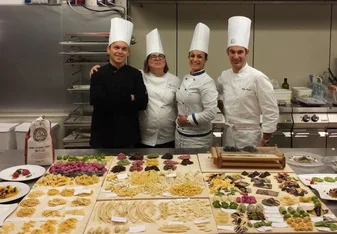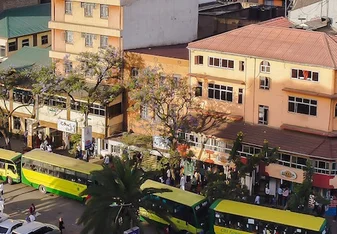Internships in Mombasa, Kenya
About
Mombasa is Kenya’s second largest city behind the capital, Nairobi. A historically strategic city for its location on the Indian Ocean, several colonizers ruled here over the centuries; its economic importance dates back far earlier. In Mombasa, gold, ivory, and spices were traded with Chinese, Persians, and Indians, among others.
Today, Mombasa is a cosmopolitan city with diverse populations of Muslims, Christians, and Hindus practicing side by side. The main language is Swahili, but expect to hear a lot of English also. The most popular industries for interns are in the medical, community development and education sectors. Mombasa is a great location for anyone who loves multiculturalism, history, nightlife and a fast-paced city with beach vibes. Spend the weekend navigating some of the largest open-air markets in the region, soaking in the rhythms of taarab music, or delving into its exciting nightlife.
Top Industries
Because Mombasa is a historic trade hub and multicultural city, there are opportunities in nearly every sector. International trade and oil refinery industry have a strong presence in the area, but the most popular internships in Mombasa revolve around the community development, medical and education fields. Most of these internships are unpaid.
Community Development
Ranging from microfinance to human rights, several NGOs give interns a firsthand look into community development at a grassroots level. For students hoping to break into international development or NGO field, an internship in Mombasa will teach invaluable skills.
Medical
Mombasa is an ideal place for students studying or interested in studying medicine, nursing or density. Mentors offer interns direct training and you'll be able to practice in a variety of settings, from urban hospital to rural clinic. You'll also glimpse technology and resource allocation in a developing country setting. Several companies offer the opportunity to learn real-world skills in a new and exciting environment.
Education
Interns interested in making a difference in the lives of young people will find plenty of chance to work in primary or secondary schools in Mombasa. Different from other countries, opportunities in education in Mombasa go beyond English as a second language and can include job readiness or STEM courses.
Planning Your Internship
Best Time to Get an Internship in Mombasa
Most internships offer a wide range of length options for your experience, ranging from a few weeks to an entire semester. The rainy months are April and May and driest are January and February. Year round the average temperature hovers around the high 80s to low 90s Fahrenheit.
Housing
Most internship programs provide homestays, which is an ideal way to better understand the country you’re interning in. If not, or if you prefer a different living arrangement, rent an Airbnb or apartment on Booking.com for when you first arrive. Then, once you make connections in the city, you can arrange more permanent housing by word of mouth. Or, look on Anza, a popular housing website in Kenya.
Cost of Living
The cost of living in Mombasa is lower than the U.S. and Canada, but some things like imported goods can be expensive. Renting an apartment ranges between $200-900 depending on the location, size and whether or not it’s furnished. A meal out starts at around $6, and groceries, like fruits, vegetables, bread and eggs are just a few dollars.
Visas
The type of visa you’ll need to stay in Mombasa will depend on the organization you intern for and whether or not you’ll be compensated for your work.
The Kenyan government offers a range of visa options for foreigners, starting at three-month tourist visas. Each step beyond this -- multiple entries, additional access to other countries in the East Africa region – is more expensive. The A Visa gives foreigners permission to work legally in the country, but you’ll need a letter of support from your organization.
Work Culture
Kenyan culture is generally more family- and community-oriented than in the United States, and this extends into the workplace. The handshake is the typical greeting, though foreigners should be respectful if Muslims do not wish to shake hands with someone of the opposite gender. When making small talk, it’s not uncommon to ask about health and family; this goes a bit more intimate than in the United States, where the weather is typical elevator conversation. Address your coworkers and superiors by their title and last name, only switching to a first name or nickname when the person indicates it’s appropriate.
While in the workplace, be sure to give complaints and directions in a smooth, unintimidating way. Don’t be as direct or upfront as you might be elsewhere. Kenyans often use stories and metaphors to explain something or prove a point, so fine-tune your ears to catch the message behind this style of dialogue.
Be sure not to get too concerned about meeting ending times -- for Kenyans, meetings will finish when all parties are satisfied, not when the schedules indicate. Most importantly, treat everyone with respect and show an interest in their lives and family.
Health & Safety
Though Mombasa is a welcoming tourist destination, foreigners should still maintain the same level of caution as they do in other parts of the world. Keep your fine jewelry and expensive clothing at home and instead opt to dress more modestly. For women, it’s encouraged to take taxis at night instead of walking home – just make sure to negotiate the price before you start the trip. For women experiencing unwanted attention, it’s recommended they always have a scarf handy to cover.
Though Mombasa hasn’t been the target of any terrorism or violence lately, it’s best to watch the news and stay alert in case of an attack.
Travelers should be sure to arrive in Kenya with all the routine vaccinations, including yellow fever and meningitis, typhoid and Hepatitis A and B. Be sure to bring lots of insect repellent to prevent malaria. Steer clear of tap water and food that’s been sitting out in the sun or heat for long periods of time. Also be aware of what type of meat you’re eating -- avoid wild game like monkey or bats. Fruits and vegetables should be washed (with treated water) and peeled.
















